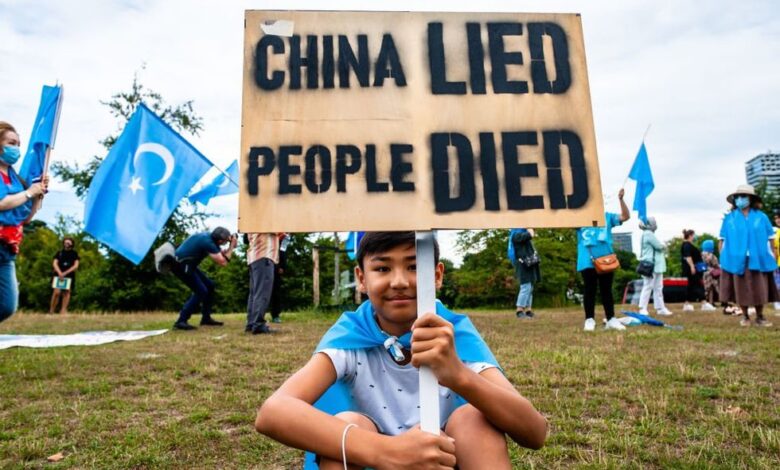America’s faith in ‘free trade’ empowered China’s apartheid machine

Like the “Free Tibet” campaign of the late 1990s, concern for China’s Uyghur population has faded into the background. In the mid-2010s, Beijing faced a short-lived wave of international criticism after General Secretary Xi Jinping created a vast network of internment camps. Nearly three million Uyghurs have been detained and subjected to brutal conditions.
Republicans looking to push back against anti-tariff Democrats should take note. This humanitarian catastrophe continues today, yet receives little sustained attention. It ranks among the most severe human-rights abuses on the planet — and American free-trade policies may have helped enable it. For decades, U.S. leaders embraced open commerce with China while ignoring the costs. That strategic blindness now carries a moral price.
Has our refusal to implement strong tariffs created a monster?
Beijing has long portrayed Xinjiang separatists as Islamic terrorists. This year marks a decade since their last major act of violence — a brutal knife attack at a coal mine that left 50 people dead, mostly Han Chinese workers and police. Horrific as it was, critics argue the assault, like previous incidents, reflected a desperate backlash against the Chinese state’s colonial-style repression.
Since Xi Jinping’s crackdown, no similar attacks have occurred. But the sheer scale of the regime’s response pushes China into apartheid territory — arguably beyond.
Reports estimate that up to three million of China’s 10-million-strong Uyghur population are now detained in so-called re-education camps. These camps aim to strip the Sunni Muslim minority of its identity and recast them as loyal subjects of the Chinese Communist Party.
Other reports indicate that many Uyghurs held in China’s re-education camps are forced to work in factories under conditions tantamount to slavery. Even more disturbing, some evidence suggests that, after “re-education,” Uyghurs are sold online in batches to employers across the country. Xinjiang produces one-fifth of the world’s cotton, and estimates say half a million Uyghurs are forced to pick it. That “free labor” gives Chinese manufacturers a competitive edge — one reportedly tied to the bankruptcy of major U.S. retailer Forever 21.
Democrats may oppose forced labor in theory, but where is the push to penalize what amounts to a 21st-century plantation economy? Would they stay silent if Russia did the same?
One of the most chilling aspects of Beijing’s ethnic campaign is its attempt to re-engineer Xinjiang’s population. This isn’t new. Seventy years ago, Mao Zedong launched a mass migration project to dilute the region’s Uyghur majority. The “Great Leap West,” introduced in 2000, revived the strategy — this time using financial incentives to bring Han Chinese into Xinjiang and offering jobs reserved for Han applicants outside the region. The policy remains in effect, along with forced out-migration of Uyghurs to other parts of China.
Even Western media outlets — usually quick to denounce any effort to reduce immigration — have expressed alarm over Beijing’s demographic engineering in Xinjiang. Many now acknowledge the regime’s mass Han migration into the region as a deliberate attempt to dilute the Uyghur population and strip the minority of any political influence.
More disturbing still are reports of mass sterilization campaigns. Chinese authorities have allegedly targeted Uyghur women to suppress birth rates. In 1990, hundreds of Uyghur men stormed a government building to protest forced abortions — a clash that ended with nearly 20 people dead.
The demographic consequences are staggering. In 1955, Uyghurs made up 90% of Xinjiang’s population. Today, they account for less than half.
Pro-Trump conservatives should grasp the strategic value of highlighting China’s use of migration as a political weapon. Doing so forces the left to confront a reality it usually denies: replacement-level immigration exists, and it carries consequences. Group identity rights don’t just apply to favored minorities — they apply to everyone, including the West.
Consider the demographic parallels. America’s historic, European-descended majority has dropped from 90% after World War II to 57% today. The left has openly — and at times grotesquely — celebrated that decline.
Like Beijing, the Democratic Party understands that demography is destiny. China aims to dominate its non-Han regions. Democrats aim to secure permanent political dominance over what they call “our democracy.”
By exposing the left’s selective outrage — condemning China’s demographic manipulation while applauding similar trends in the West — conservatives can force a reckoning. If it’s wrong in Xinjiang, it’s wrong here, too. And no amount of rhetorical gymnastics can cover up the left’s inconsistency, arbitrariness, and odious bigotry.
China’s mass enslavement of millions should spark outrage at least equal to what the West once directed at apartheid South Africa. That regime was boycotted into submission. Why shouldn’t the same standard apply to Beijing?
As President Trump has rightly asked: Why did we admit China into the World Trade Organization in 2001? What made anyone believe it would ever play by WTO rules — rules it had already vowed to ignore behind closed doors? Was George W. Bush’s administration, along with the now-defunct neoconservative GOP, truly naïve enough to think trade would transform China into a democracy?
More to the point, have we — not just our leaders, but the American people — enabled this? By enriching China through free trade, have we given it the means to carry out apartheid-level abuses against its Turkic Muslim minority?
And has our refusal to implement strong tariffs created a monster?
The anti-Trump, anti-tariff chorus must answer these questions. Its blind faith in globalization didn’t just cost us factories and jobs. It helped fund a regime that builds camps, crushes dissent, and rewrites humanity in its own image.




